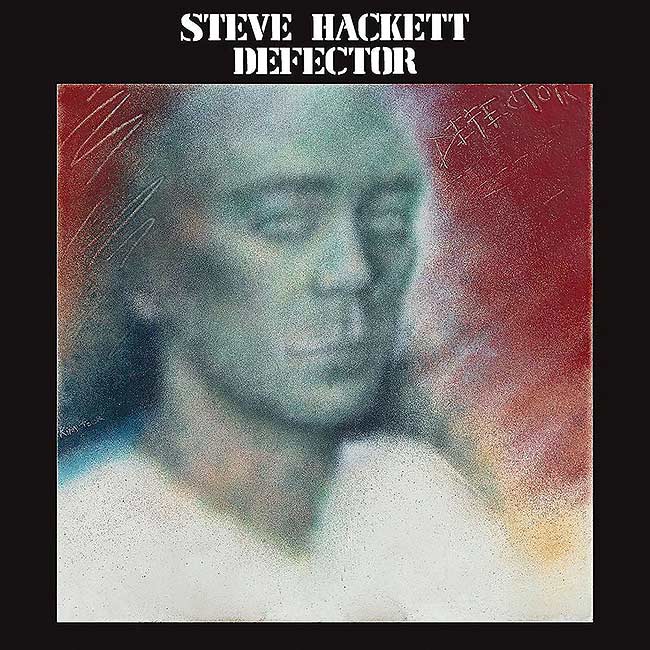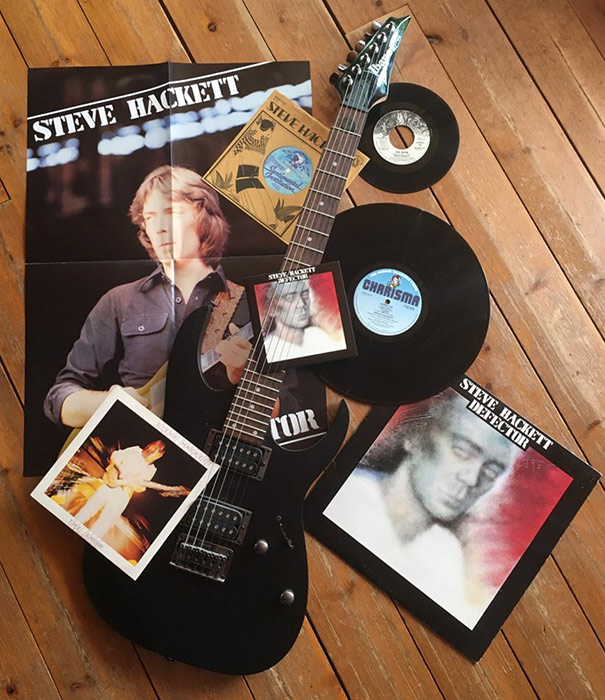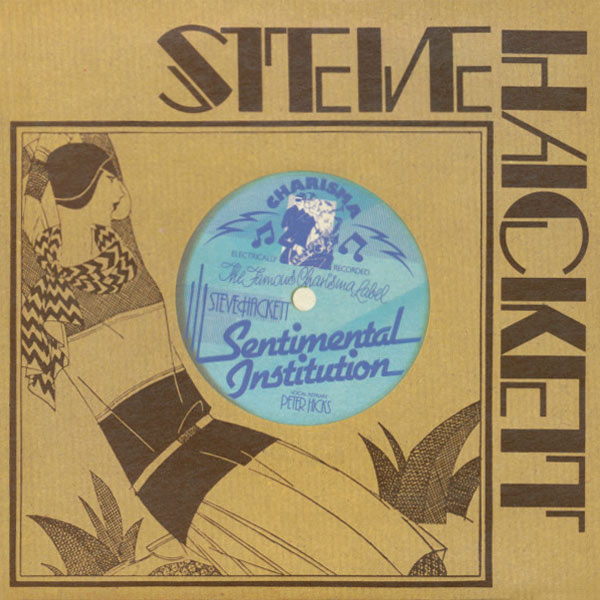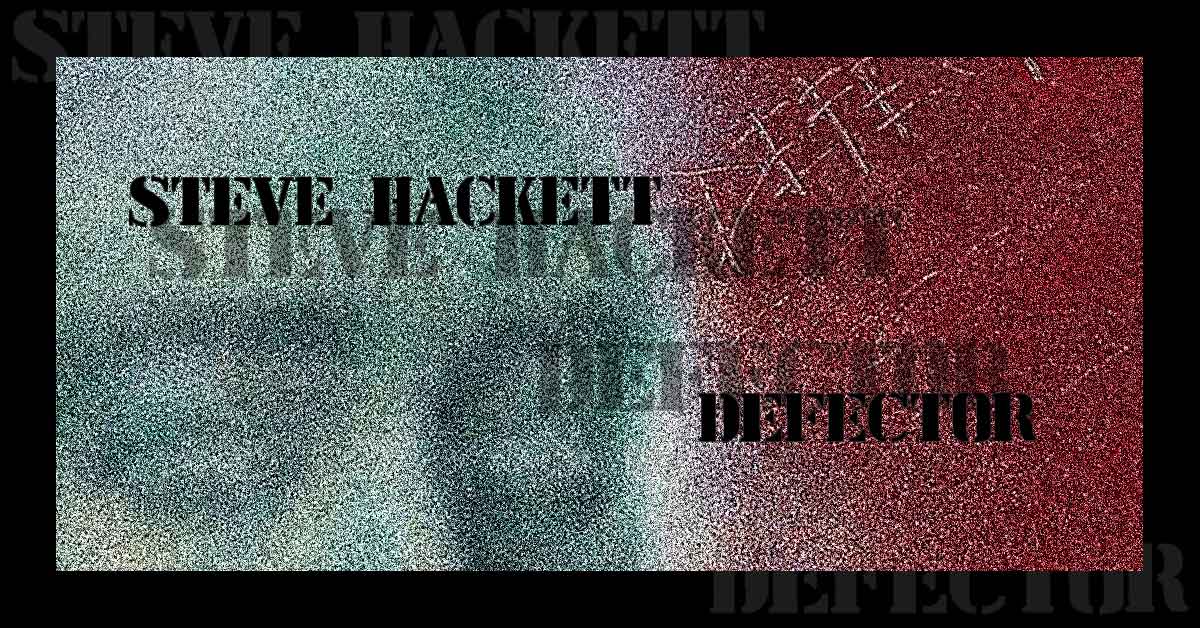- Article
- Read in 9 minutes
Steve Hackett – Defector – album review
Steve Hackett and his touring band recorded a new studio album in 1980. Thomas Jesse took a closer look at Defector, which was the fourth solo album by Steve Hackett.
Having left Genesis, Steve soon established himself in the music business with a solo career. He released two very respectable albums and began touring in the end of 1978. Whereas Please Don’t Touch was a bit of a mixed bag with all the musicians involved, Spectral Mornings was more coherent and you feel it was recorded with his live band. Defector continues in that vein.
At the end of the 1970s, Steve’s label, Charisma Records, had financial problems [*1] caused probably as much by the faltering UK economy as by a change in musical taste (punk, New Wave).
Only Genesis’ …And Then There Were Three… sold well for Charisma and went Platinum in the UK. The pressure was on Steve to produce an album with more commercial songs. The band had already played some of the songs that were to be recorded on stage (The Steppes, Sentimental Institution, Hercules Unchained) or had at least rehearsed them. [*2] After a long tour Steve took his band and his best-selling album so far [*3] into Wessex Sound Studios at Highbury in the spring of 1980 [*4]. He wanted to create good, catchy material to continue on his current wave of success. Studio time was expensive, there was a lot of pressure from the label (and himself) and the next tour had already been scheduled [*5]
Taking inspiration from the political drama The Conformist by Bertolucci (after a novel by Alberto Moravia) [*6], Steve planned to write a concept album about a refugee from the East Bloc, The Defector, in which the different ways of living in the East and the West were to be outlined and their effects on the protagonist contrasted. However, Steve had never been beyond the iron curtain. In the end, the album concept became a metaphor for issues such as alienation, imprisonment in unchangeable situations and the escape from that or from oneself.
The band consisted of:
Steve Hackett: guitars, Optigan, Roland GR-500 guitar synthesizer
John Hackett: flutes
Nick Magnus: keyboards, Roland VP-330 vocoder
Dik Cadbury: bass
Peter Hicks: vocals
John Shearer: drums
Recording sessions went remarkably quick; production went by without major corrections and tweaking so that the album was completed in less than two months. It appeared in June 1980.
Reaching #9 in the UK charts [*7], it would become Steve Hackett’s most successful album so far.
The Show backed with Hercules Unchained was released as a single. as well as Sentimental Institution with The Toast as b-side.
The CD remasters contain Hercules Unchained as well as live performances from the Defector tour and from Reading Festival.
Cover / Artwork

The artwork for the album came from Steve’s then wife Kim Poor. In her inimitable style of diaphanism [*8], she painted a portrait of a dreaming Steve with eyes where no pupils are visible (probably a visualisation for a view inside, into the world of one’s soul) before a dark red background into which he all but vanishes. The rear shows two female nudes (Two Vamps As Guests) leaning into each other with their eyes closed, too. One is painted in dark night blue, the other in light ochre brown.
The English first release of the album contains a lyrics sheet with band photos and a poster of Steve in action on the stage of Reading Festival. Other releases typically had a white dust sheet with a black and white portrait shot of Steve.
The Songs
The Steppes
The longest track of the album (more than 6 minutes) begins with a tender flute intro (with a touch of echo), that is followed by a gloomy, powerful drum solo. Dark minor chords, repeating guitar solos and ghostly walls of keyboard sounds catch the beginning.
The Steppes was already played in the second half of the Spectral Mornings tour. It is a perfect expression of the atmosphere of this album. Steve was inspired by images of the Asiatic steppes that make out large parts of the former Soviet Union: The wind, the wastelands, a pale sun, the infinitely lonely landscape. This justly became an alltime live favourite that enjoyed his biggest moment in the 2018 orchestral shows. It is one of the most impressive tracks Steve has created in his solo career – a great opener!
Time To Get Out

The cliché lyrics contrast the West contaminated by drugs („joints were smoked at lunchtime“) with the East inebriated by Vodka („Vodka helps me to sing much easier“). Pretty simple lyrics in top of an uptempo three-chord song. A pretty pattern of verse-chorus-verse with some lalala backing vocals and neat guitar gimmicks make eyebrows go up: Hackett goes pop? Does the song title address the musician’s desire to leave his band?
Slogans
The second instrumental on the album. Powerful keyboards, cutting guitar riffs, Steve’s typical tapping, fragile flute sounds and thundering drums interpret the madness of cold war. The wall of sound is crowned by Nick Magnus’ Vocoder voice calling “Beware the mighty Magnatron” (sic!).
Leaving
The ballad illustrates the culture shock the „defector“ suffers as the immerses himself in the new life in the West. The track presents a 12-string melody, Pete Hicks’s vocals accompanied by Steve and Dik Cadbury and a brief flute solo by John Hackett that takes up the melody of the album opener. The all too short song runs out dreamily, romantically with the words „People dream in colour here/So they said shine your shoes from ear to ear/Right or left the west.
Two Vamps As Guests
The first side of the album (LP) comes to an end with the mandatory Hackett solo on the acoustic guitar. It is as beautiful as Horizons and Kim but not as well-known. The protagonist remembers his Eastern home with a nod to the music of Tchaikovsky.
Jacuzzi
The second side of the album begins with a jazzy industrial homage to the decadent Western way of live. Hackett likes to play this fast number live. It has a great flute solo, great guitar tapping and weird speed changes; there is something of Ace Of Wands in it.
The track shows how much this band are in tune with each other and how much they enjoy playing together. Along with The Steppes, this is another great opener and another highlight on the album!
Hammer In The Sand
Another instrumental, though the band also rehearsed it with vocals. Nick Magnus played the melody solo on a Bösendorfer piano that stood in the studio. Steve was so excited that he recorded it as an instrumental. A piano track that is accompanied by orchestral samples from the Prophet 5 synthesizer, Roland guitar synthesizer and mellotron. Sounds like Rachmaninoff. A wonderful piece! [*9]
The Toast
The melancholy continues. The twelve-string guitar picks up the tune from the previous track and Pete Hicks begins to sing. As the title indicates the consumption of alcohol. One would expect loud music and a boisterous partying round, and the lyrics support that idea: „Round and round and up and down/Drinking all the vine we found/Not so easy to remain/Steady happy…” In fact, the song is quiet and sad. It is crowned by one of the most beautiful flute solos by John Hackett (starting at 1:38), before it moves into the second verse (2:50) that appears to be remembering a lost love.
The Show

The dream ends abruptly. A funky bass introduces The Show. This is, in fact, a disco song that highlights the advantages and disadvantages of life in the rock ‘n roll world: „…Yes rock music should be free / Money’s worth less and less…“
The promo video for this only single release from the album is hilarious. Steve pulls the strings on marionettes that look like the band playing the song. They are all dressed in suits and bowler hats. Or are they the real live musicians in dress-up? [*10] Is this an ironic statement on the showbiz that urges the artist to make music than is suitable for the radio (artistic freedom, my foot)? An allegory on the cold war in which politicians pull the strings to stay in power? This pop disco number has sparked much controversy amongst the fans. Perhaps we can see it as Steve bowing ironically, ambiguously before the forces of the music industry and at the same time taking the mickey out of it.
Sentimental Institution
The album finale is a weird big band number in the style of the 1940s. Steve uses the sound effects of an optigan. This optical organ [*11] was similar to an electronic organ that reproduces sounds that were copied onto optical discs when a key was pressed. This instrument came out in 1971 as a smaller brother of the mellotron and a forerunner of the synthesizer. Steve mixed a number of sounds, Pete Hicks, co-composer of the song, added a 1940s voice to it, voila: Here we have Glen Miller, Louis Armstrong and the lot! This piece was first played at later shows of the Spectral Mornings tour and stunned the audience. Pete Hicks proves what a wonderful, flexible voice he has. His last hurrah on his last recording with Steve Hackett is very impressive.
Hercules Unchained

The flipside of the single was already played on the Spectral Mornings tour. Catchy metal guitars introduce a fast rock ‘n roll piece full of gimmicky vocoders, guitars and keyboards. Hackett goes Status Quo is one way of putting it. A live favourite that leaves no major lasting impression.
All in all
Defector is usually called the last of the four classic Steve Hackett albums. It shows a brilliant band taking up Steve’s songwriting ideas and giving them their own character. The album is darker than its predecessors and more political. The warmth and the magic of the “spectral morning” has given way to the cold and loneliness of The Steppes.
Five instrumentals are balanced by five songs with wonderful vocals by Pete Hicks. The basic concept of showing a defector’s feelings as he starts over in a new culture is an allegory rather than a real story. Steve’s attempt to come to terms with the world of cold war remains vague. You could also see it as an exploration of the artist’s role in a commercialized society, yes, even as Steve coming to terms with his leaving Genesis (Time To Get Out, Leaving).
Steve shows himself a jack of all trades. He combines jazz elements with prog an pop, quotes pre-war big band sounds and pays homage to classical music while sort of keeping touch with Genesis. A track like leaving would not have been out of place on Wind & Wuthering.
Perhaps Defector is not rated as high as his previous albums because of the tendency towards pop (e.g. The Show), but it is an important part of Hackett’s output. Even today the variety of styles will surprise you, pull you in and give you pleasure when you listen to it.
Despite or because of its tendency to pop sounds this album met commercial success.
Defector went to #9 in the UK charts in June 1980 and made Steve Hackett the third successful (ex-) member of Genesis to chart along with Genesis (Duke, #1 in April) and Peter Gabriel (PG III, #1 in summer). [*12]
„…Our belief in the album was justified as Defector became a UK top hit in June 1980. To this day, it remains one of my personal favourite albums.” [*13]
We have nothing to add to Steve Hackett’s words.
Author: Thomas Jesse
English by Martin Klinkhardt
Defector is available in various forms. The 2CD/DVD set contains the album, an extra bonus track (Sentimental Institution live) and a bonus CD with recordings from the Reading Festival (August 28, 1981). The DVD contains a 5.1 surround mix, albeit only an up-mix because the original multi-track tapes could not be found. The standard CD contains three other live bonus tracks from the Reading Festival, The Steppes, Slogans and Clocks.
Notes:
*1. Alan Hewitt, Sketches of Hackett, Wymer, Bedford, 2nd edition 2011, p. 79
*2. cf. setlist.fm
*3. Spectral Mornings went to #22 in the UK charts according to www.Chartsurfer.de
*4. cf https://en.wikipedia.org/wiki/Wessex_Sound_Studios
*5. The tour was to begin on June 11, 1980 in the UK
*6. https://en.wikipedia.org/wiki/The_Conformist_(1970_film)
*7. Cf the liner notes for the 2005 remaster, Virgin VJCP-68776, Mini-LP-CD
*8. Diaphanism: https://www.youtube.com/watch?v=EY4YdeO9lY0 und: https://www.kimpoor.com
*9. A new recording can be heard here: https://www.youtube.com/watch?v=X0dIgKtrfXw
*10. The video can be seen here: https://www.youtube.com/watch?v=WaIbdloOsZI
*11. https://en.wikipedia.org/wiki/Optigan
*12 For the chart notations, see note 3
*13 Liner notes for the 2005 remaster, Virgin VJPC-68776, Mini-LP-CD

